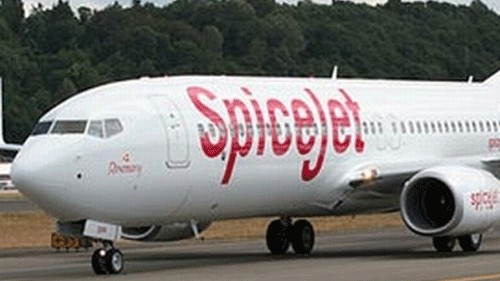
SpiceJet has dismissed KAL’s claims as baseless and legally untenable.
PTI file photo
Last week, SpiceJet was in the news after former owners KAL Airways and Kalanithi Maran sought more than Rs 1,323 crore in ‘damages’ from the airline following a judgement by a division bench of the Delhi High Court. SpiceJet dismissed KAL’s claims as baseless and legally untenable. In this edition of DH Deciphers, Abhilash Reddy, examines this latest flashpoint, as well as other issues facing the beleaguered airline.
What did the Delhi High Court say?
Setting aside the single judge bench order that had upheld an arbitral award asking SpiceJet and its promoter Ajay Singh to refund ₹579 crore plus interest to Mr. Maran, the division bench allowed the appeals and remanded the matter back to the court concerned to consider the petitions challenging the arbitral award afresh.
"This claim was thoroughly examined and subsequently rejected by a panel of three retired Supreme Court judges. Following this, KAL Airways and Kalanithi Maran appealed to the single-judge bench of the Delhi High Court, seeking the same amount in damages, which was again rejected by the court," SpiceJet said.
When did the ongoing dispute actually begin?
The case dates back to early 2015, when Ajay Singh, who owned the airline earlier, bought it back from Mr. Maran after it was grounded for months due to financial difficulties. As part of the agreement, Maran and his KAL Airways reportedly paid ₹679 crore to SpiceJet in lieu of warrants and preference shares. However, Maran approached the Delhi High Court in 2017, alleging that SpiceJet never issued the promised securities and requested the return of his money.
When did Kalanithi Maran buy SpiceJet and why did he sell it?
In 2010, the airline was taken over by Kalanithi Maran-owned KAL Airways (a subsidiary of the Sun Group) for Rs 750 crore through acquisition of a 38% stake from American private equity investor Wilbur Ross and the UK-based Kansagra family. And before Ajay Singh reacquired the airline, Maran invested another Rs 800 crore, increasing his share in the company to 53%. The airline began making profits in 2010 and 2011 after reporting losses for 10 years.
But the trend soon reversed when the airline incurred huge maintenance, repair and overhaul costs, which were 30-40% more than the normal. The other reason was the low utilisation of new planes, as well as issues with engine suppliers. The airline began making losses from mid-2013 onwards despite high demand in the market. All the efforts by KAL Airways to bring about a turnaround culminated in SpiceJet's reacquisition in 2015 by Ajay Singh for a token amount of Rs 2 along with the debt of over 1,400 crore and other liabilities of over Rs 2,000 crore.
What were the issues plaguing SpiceJet ever since its reacquisition?
SpiceJet was already reeling in losses when Ajay Singh bought it back. Dues were not paid to leasing companies and vendors selling spare parts. Some of its new planes were grounded due to lack of spares. Apart from the financial difficulties, the airline found itself embattled in legal disputes starting with Maran who approached the Delhi High Court in 2017. The Covid-19 pandemic in 2020 worsened the airline’s financial woes.
Since last year, SpiceJet has seen multiple lessors approaching the National Company Law Tribunal seeking insolvency resolution proceedings against it, in a bid to clear pending settlements. It also had its flights reporting serious incidents (at least eight mid-air incidents and an accident forcing the airline to either cut short its journey and turn back its aircraft and land at the airport of origin, or continue to its destination with "degraded safety margins) which led to the Director General of Civil Aviation issuing notices to it and investments over Rs 1,000 crore to bring about a turnaround and make the airline healthy financially.